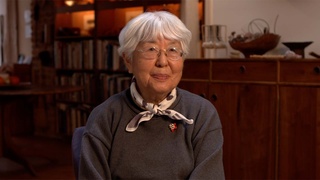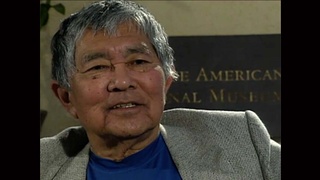Interviews
Company in Tokyo burned down (Japanese)
(Japanese) Even if I want to go home, I can’t so it’s useless. There’s no use thinking about it.
I*: During the war, if Pearl Harbor hadn’t been attacked, would you be in Japan now?
Yeah, of course. I was going to go back to Japan. I had started a company in Tokyo.
I: What happened to that company? What happened to that company? That company in Tokyo?
It burned down. Burned down. Even though I had built a company it burned up.
* "I" indicates an interviewer (Eriko Yamamoto).
Date: October 14 & 17, 2004
Location: California, US
Interviewer: Eriko Yamamoto
Contributed by: Watase Media Arts Center, Japanese American National Museum.
Explore More Videos

The lack of discussion about family’s incarceration in Amache
Sansei judge for the Superior Court of Los Angeles County in California


Her mother came to the U.S. with a group of picture brides
(b. 1923) Japanese American poet, activist

Her father bought her mother American clothes after she arrived from Japan
(b. 1923) Japanese American poet, activist

Her brother’s reasons as a No-No Boy
(b. 1923) Japanese American poet, activist

Her grandfather was pressured to teach Japanese
Sansei judge on the Superior Court of Los Angeles County in California

Neighbor took care of her mother after grandfather was taken by FBI
Sansei judge on the Superior Court of Los Angeles County in California

Immediately after the bombing
(b. 1938) Japanese American. Hiroshima atomic bomb survivor

Other family members not as lucky
(b. 1938) Japanese American. Hiroshima atomic bomb survivor

His parents had little hope that he had survived the atomic bomb
(b. 1938) Japanese American. Hiroshima atomic bomb survivor

His views on nuclear weapons
(b. 1938) Japanese American. Hiroshima atomic bomb survivor

Loss When Leaving for Manzanar
Japanese American animator for Walt Disney and Hanna Barbera (1925-2007)

Forcibly deported to the U.S. from Peru
(b. 1936) Japanese Peruvian incarcerated in Crystal City

Stories of Grandfather at a concentration camp in Fusagasuga
(b.1974) Japanese Colombian who currently resides in the United States

Her grandfather in a concentration camp in Fusagasuga (Spanish)
(b.1974) Japanese Colombian who currently resides in the United States
